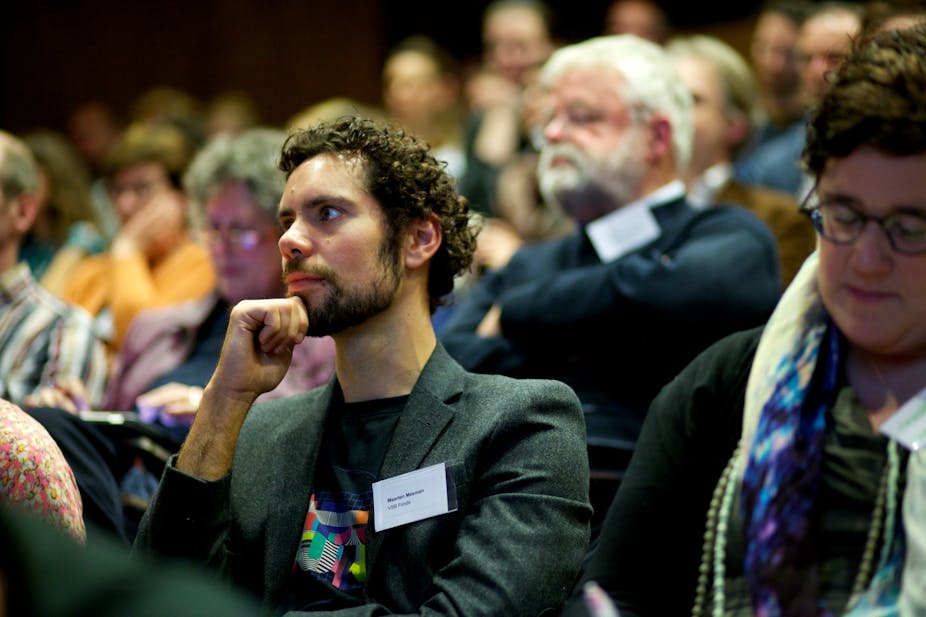Having worked as a journalism and media studies academic in the United Kingdom for the best part of 25 years, one of the things that surprised me on coming to Australia was the state of near-open warfare between some journalism educators and the country’s biggest private media group, News Corp.
Yesterday’s piece in The Australian is the latest outbreak of skirmishing. That title’s Media Editor Sharri Markson went “undercover” to reveal alleged scholarly bias against her parent company.
Around the time of the Finkelstein Inquiry into media regulation in 2012, there was a lengthy attack by the Australian’s Cameron Stewart on “lecturers from four of Australia’s top journalism schools”.
I remember it especially because he named me as one of those who, in an “experts respond” piece that appeared in this publication, had “enthusiastically embraced Ray Finkelstein’s central recommendation for a new government-funded regulatory body to sit in judgment of news reporting”.
I found this odd at the time, because I had actually stated the opposite when asked my view by The Conversation. If I may be permitted to quote myself just this once, in the cause of corroboration:
I’m not usually supportive of statutory press regulation in terms of political viewpoints. And I would need to see more of the detail of what kind of powers [Finkelstein’s proposed new body] had. But the obvious danger would be that a future government could use this to suppress or bypass legitimate media scrutiny.
I wouldn’t describe that as an “enthusiastic embrace”, more a qualified rejection of statutory press regulation in Australia.
I continue to pay my subs to The Australian and Foxtel, let me add, (and the Times & Sunday Times in the UK) – not least because I share Rupert Murdoch’s view that good citizens should be prepared to pay for good journalism, and there is plenty of that to be found in the News Corp empire.
And here is the point – academics in journalism, media and communication studies have not just the right, but a duty to research, write about and teach both the best and the worst of journalism.
Journalism is too important to be left to journalists alone, and it is an essential element of our democracy that the media themselves be subject to scrutiny. We need the media watchdogs – but who will watch over them, if not we scholars, paid by the public purse, and supported by the intellectual autonomy to resist intimidation?
A free press – of which News Corp is one of the world’s major providers – is inseparable from freedom of intellectual enquiry and opinion. Free media and free universities are two sides of the same democratic coin.
The Australian newspaper is perhaps unique among News Corp’s leading titles, it has to be said; the UK Times and Sunday Times rarely indulge in such high-profile character assassinations of lowly college lecturers.
It’s as if they think journalism academics in Australia should be uncritical cheerleaders for the corporation that will employ many of their graduates. It is as if criticism of the CEO – a deeply tarnished figure all over the world, thanks not to the criticisms of a few Australian university lecturers but the unprecedented scandal of phone-hacking and law-breaking on an industrial scale which went on at his UK HQ – is somehow treasonous to journalism.
It’s surely not the role of a university to provide suitably docile labour for newsrooms – but rather to contribute to the survival of a genuinely free and independent media, aware of and reflective on its own imperfections and shortcomings.
We do train journalists in Australian universities, and I think we do it well. We work with News Corp, Fairfax, the ABC and commercial broadcasters, involving them in our teaching, supplying them with the best of our graduates. The former editor of Brisbane’s Courier-Mail, Michael Crutcher, is a QUT journalism graduate, and there are many more like him in the highest ranks of the Australian news media.
Those mutually beneficial relationships do not preclude rigorous scrutiny and, when warranted, fair criticism of how the media go about their business.
The key term here is “fair”.
Academics should not use their privileged positions to act as ideological campaigners against this or that perceived enemy in the media. If they wish to criticise Rupert Murdoch in a book, or News Corp in a research project, they must do so in a scholarly and evidence-based fashion, and with the right motives. They must do so without fear or favour, in the name of a public whose best interests are not measured by the size of a media baron’s bank balance.
When journalism academics express opinions they need to be distinguished from the kind of scholarship which appears in peer-reviewed journals and research reports. Opinion needs to be clearly labelled – the same rules apply to journalistic commentaries and editorials, as any first-year journalism student will learn.
And a newspaper such as The Australian should be big enough, and confident enough in its own role as the leading national voice within the Australian press, not to be too concerned about the lectures, writings or statements of a few academics.
In the UK, when I worked there, we’d have given our left arms (or right – let’s not be biased here) to be given such attention and publicity by the country’s biggest media company.
We would have cited it in promotion bids and research evaluation audits as evidence of impact. Over there, media outlets tend to ignore those media scholars with whom they disagree, and hope that everyone else does too.
With that in mind, those journalism academics attacked in The Australian’s latest beat-up might take comfort from Oscar Wilde’s dictum that the only thing worse than being talked about, is not being talked about.

